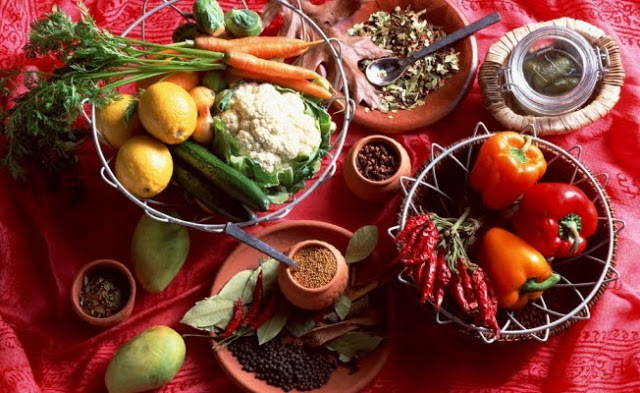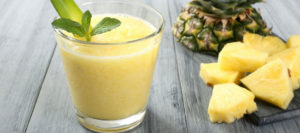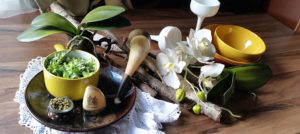Ayurveda describes sweet (Madhura), sour (Amla), salty (Lavana), bitter (Katu), pungent (Tikta) and astringent (Kashaya) tastes. Ideal meal should include all these six tastes. Each taste has its own effect on the body as well as mind. Here are short description and example of each taste.
Madhura (Sweet)
Physical effects: Sweet taste is natural to body since birth; small babies enjoy the sweet taste of breast milk. It is beneficial to the health of skin, senses and general growth and strength of the body. It pacifies Vata and Pitta. Excess use aggravates Kapha and lead to obesity, diabetes, increased cholesterol.
Psychological effects: Sweet taste gives a feeling of satisfaction, increases cheerfulness, love and compassion. But if consumed in excess, it increases greed and attachment.
Sourse: Milk, grains, honey, sweet fruits, coconuts, raisins. Processed foods high in refined sugars are not appropriate choice and cause an addiction.
Amla (Sour)
Physical effects: Increases the digestive power, regulates peristalsis, stimulates salivation and increases the appetite. It promotes strength and stability of tissue-elements. Sour taste pacifies Vata, but increases Pitta and Kapha. Excess of sour food can lead to thirst, hyperacidity, heartburn, loss of skin tone, skin rashes, gastritis and ulcerative colitis.
Psychological effects: Sour taste is very sharp. It brings alertness to the mind and increases attention. It is responsible for bringing appreciation but if consumed in excess it brings out hate, jealousy.
Source: Dairy product (Sour yogurt, cheese), vinegar, grapes, tomatoes, citruses.
Lavana (Salty)
Physical effects: Salty taste primarily gives relish to the food. It has a laxative effect, liquefies mucus and clears the body channels. It improves digestion and increases salivation, balances the blood pressure by maintaining electrolytes in the body. It gives muscles strength. Salty taste pacifies Vata, but increases Pitta and Kapha. Excess consumption can cause premature graying of hair, wrinkles, baldness and inflammatory diseases, edema and increased blood pressure, hyperacidity.
Psychological effects: Salty taste enhances the taste of food so one can enjoy it. This taste brings interest and enthusiasm.
Source: Common table salt, rock salt, seaweed.
Katu (Pungent)
Physical effects: Pungent taste is hot and improves digestion. It stimulates the digestive fire (Agni) in the body, improves circulations and clears the channels. It has an anti-spasmodic action. It produces heat in the body and breaks clots in the circulation. Pungent taste pacifies Kapha, but it aggravates Pitta and Vata. Excess consumption causes irritation and inflammation. It can cause diarrhea, peptic ulcers, giddiness, insomnia, some skin conditions.
Psychological effects: Pungent taste also has sharp and penetrating effects on the mind. It aids the clarity of mind, increases attention and brings clarity of perception.
Source: Chili, jalapeno, black pepper, garlic, onions, ginger, cumin.

Tikta (Bitter)
Bitter taste produces a very unpleasant taste in mouth. In spite of this, it is important to incorporate this taste in our meal.
Physical effects: Strong wormicidal action, anti- inflammatory and cleansing effects. Has appetizing effects, reduces burning sensation, skin diseases. Excess consumption of bitter taste leads to loss of strength and energy and increased Vata.
Psychological effects: Bitter taste helps to withhold the mind and senses from objects of desire.
Source: Spinach, kale, and other dark green leafy vegetables.
Kashaya (Astringent)
Physical effects: It gives an immediate drying sensation in mouth. By its drying property, astringent taste absorbs water and helps in binding stools. It constricts the different channels of the body, purifies blood by its anti-inflammatory effects. It reduces Pitta and Kapha, but iincreases Vata. Excess use causes constipation along with distension of abdomen. It affects the sperm count and can even reduce the sex drive.
Psychological effects: Astringent substances help the mind to become collected or organized. But excess consumption causes insomnia, anxiety and depression.
Source: Beans, unripe banana, chickpeas, tea leaves, alum and okra are good sources of astringent taste.
Dr. Athira C.K (BAMS)
Consultant Physician at Aadya Resorts and Healthcare, Bengaluru





